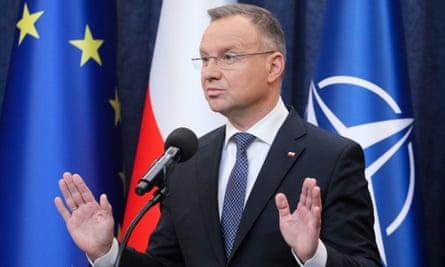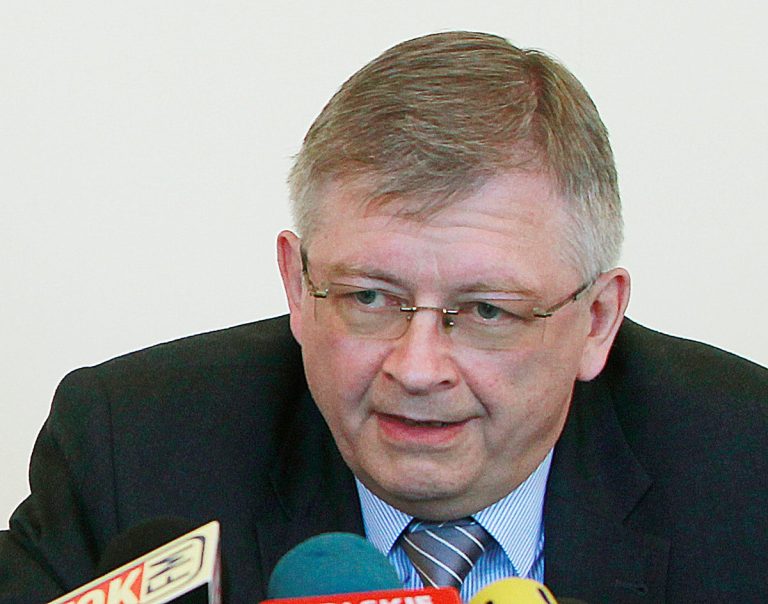Polish president delays appointing new government | Poland

Poland’s president will not convene a new parliament until nearly a month after a three-way opposition alliance won an overall majority, which could delay the installation of a new government until well into December.
Andrzej Duda, who is allied to the ruling nationalist Law and Justice (PiS) party, said he would call the first sitting of the new parliament for 13 November and would announce his nomination of a candidate for prime minister later.
PiS finished first in the 15 October ballot but has no viable path to government, while the opposition coalition, led by Donald Tusk, a former prime minister and European Council president, this week confirmed its majority and said it was ready to take power.
Speaking in Brussels on Thursday, Tusk said it would be better not to drag out the process of appointing a new government as Poland needed to act quickly to ensure it got EU funds, which have been frozen owing to rule-of-law concerns.
“If the president quickly acknowledges the reality that there is a majority in parliament and allows it to create a government, I guarantee that it will mean a quick payment of funds to Poland,” Tusk said.
Under Poland’s constitution, the president has 30 days from election day to convene the new parliament and another 14 to nominate a candidate for prime minister, who must form a cabinet that is put to a confidence vote in parliament.
Duda said on Thursday: “I can say that the preliminary date of the first session of the lower house of parliament will be Monday 13 November, which is the fastest possible date taking into account constitutional norms.”
He said there were two “serious candidates” for the post of prime minister, the incumbent, Mateusz Morawiecki, and Tusk, adding that Poland faced a “new situation” that required further reflection.
President Andrzej Duda said he would call the first sitting of the new parliament for 13 November and would announce his nomination for a candidate PM later. Photograph: Paweł Supernak/EPA
Duda has previously said he intended to follow tradition by nominating the candidate of the party that won most votes. PiS won with 36% of the vote but the opposition alliance has a clear majority of 248 seats in the 460-seat parliament.
Since PiS appears to have no path to a majority, it is expected to lose a confidence vote, at which point MPs would be free to nominate their own candidate for PM – but the delay could mean a new government is not in place until well into December.
The president met the leaders of the five parties in the new parliament on Tuesday and Wednesday and made it plain he would not be rushed, said Szymon Hołownia, of the Third Way, part of the opposition coalition with Tusk’s Civic Coalition and the Left.
skip past newsletter promotion
Sign up to Headlines Europe
A digest of the morning’s main headlines from the Europe edition emailed direct to you every week day
„,”newsletterId”:”headlines-europe”,”successDescription”:”A digest of the morning’s main headlines from the Europe edition emailed direct to you every week day”}” config=”{„renderingTarget”:”Web”}”>Privacy Notice: Newsletters may contain info about charities, online ads, and content funded by outside parties. For more information see our Privacy Policy. We use Google reCaptcha to protect our website and the Google Privacy Policy and Terms of Service apply.
after newsletter promotion
“The president made it clear that he will convene the first session probably at the last moment; he used the phrase that he did not want to shorten the term of this parliament,” Hołownia said after talks with the president.
PiS critics have suggested Duda may be deliberately delaying the process. Some suggest PiS may be trying to persuade individual opposition MPs to support it, although it seems unlikely to be able to win over the 37 MPs it would need. Others have argued that PiS may simply be trying to make life as difficult as possible for the new government, or could be buying time to get rid of potentially incriminating evidence of alleged illegal behaviour in office.
Various opposition leaders have previously suggested that several senior PiS figures, including Duda, Morawiecki and the former prime minister Beata Szydło, could find themselves before a state tribunal once a new government is in place.
During its years in power, PiS has eroded the rule of law in Poland, rolled back abortion rights and targeted minorities with hateful propaganda, prompting a feud with the EU over issues ranging from judicial independence to LGBTQ+ rights.






